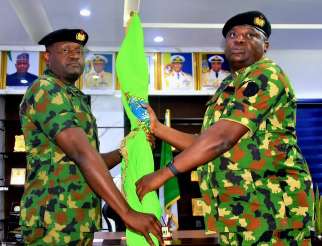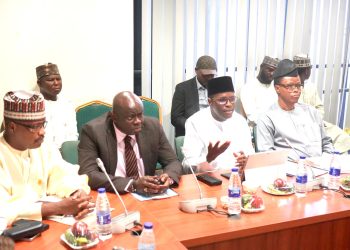By Nkechi Eze
The Executive Chairman of the Fiscal Responsibility Commission (FRC), Victor Muruako, Esq., has called for a renewed nationwide advocacy drive on the Fiscal Responsibility Act (FRA) 2007, describing it as a vital legal framework for promoting transparency, accountability, and prudent management of public funds in Nigeria.
In an official statement issued by the FRC’s Deputy Director of Strategic Communications, Bede Ogueri Anyanwu, it was disclosed that Muruako, speaking at the Commission’s headquarters in Asokoro, Abuja, while receiving Retired Commodore Ogechi Osuagwu (Ochiagha) a respected member of the League of Professionals and former frontline State Executive Committee member of the Peoples Democratic Party (PDP) in Imo State, stressed that greater public awareness of the FRA would further strengthen its enforcement and help institutionalise fiscal discipline across all tiers of government.
The FRC boss noted that the FRA 2007 has remained a robust legal instrument in curbing financial leakages by mandating that every kobo allocated for public use be prudently and transparently accounted for.
“The Act has helped to block leakages in many government sectors, every kobo must be prudently and transparently accounted for,” Muruako reiterated. He recalled that before its enactment in 2007, public officials often spent funds at their discretion with little or no oversight, a situation that created room for widespread mismanagement of public resources.
The FRC Chairman urged Nigerians to embrace the provisions of Section 51 of the Fiscal Responsibility Act, which empowers any citizen without needing to prove special interest to demand transparency and accountability in the management of public finances. “You can go to court. You can organise advocacy campaigns. You can even establish NGOs dedicated to good governance and responsible public finance. The law gives you that power,” he stated.
Muruako emphasised that broad-based civic engagement and active citizen participation are crucial to the sustainability of the reforms envisioned by the FRA, stressing that only a well-informed public can effectively demand accountability from those in positions of authority.
In his remarks, Retired Commodore Osuagwu lauded Muruako’s visionary leadership, describing the FRC as “a vital agency in the life of the Nigerian economy.” He acknowledged that while Nigeria started on a flawed path in public financial management, the introduction of the FRA 2007 has been a game-changer. “We started on the wrong note, but with the Fiscal Responsibility Act of 2007, we are beginning to get it right,” he said.
Reflecting on the pre-FRA era, Osuagwu noted that “there was so much rot and corruption in the system before the Act was established,” and called on Nigerians to not only ensure prudent management of national resources but also adopt the same discipline in handling their personal finances.
He further advocated for strengthening the Fiscal Responsibility Act to give it greater enforcement powers and deterrent effect, pledging his personal support to the Commission’s advocacy drive. Describing Muruako as “an achiever and goal-getter who delivers on every assignment entrusted to him,” Osuagwu said the FRC’s work is indispensable to Nigeria’s economic stability and long-term growth.

















